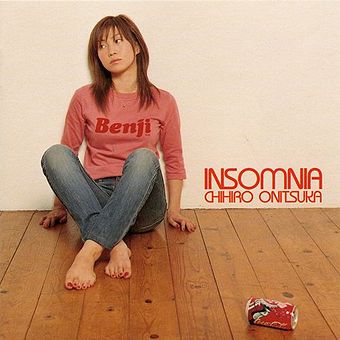Update @ July 7, 2025: If you are having issues with the site (including any PHP errors), please contact us via Facebook. Thank you!
Insomnia (Onitsuka Chihiro): Difference between revisions
From generasia
FoxxyFuyumi (talk | contribs) No edit summary |
mNo edit summary |
||
| Line 25: | Line 25: | ||
# [[Memai (Onitsuka Chihiro)|Memai]] (眩暈; ''Dizzyness'') | # [[Memai (Onitsuka Chihiro)|Memai]] (眩暈; ''Dizzyness'') | ||
# [[Gekkou|Gekkou (album version)]] (月光; ''Moonbeam'') | # [[Gekkou|Gekkou (album version)]] (月光; ''Moonbeam'') | ||
; Information | ; Information | ||
''Insomnia'' is [[Onitsuka Chihiro]]'s debut album, which was released a month after the release of her fourth single, [[Memai / Edge|Memai / edge]]. As well as the single songs with tie-ups, three songs from this album had additional tie-ups. [[Innocence]] was used as the [[Applied Material-sha|Applied Material-sha]] CM song, [[Back Door|BACK DOOR (album version)]] was used at the NHK TV show [[Yume Densetsu|Yume Densetsu]]'s ending theme song and [[Rasen]] was used as the movie [[Wasabi|Wasabi]]'s insert song. The album reached #1 on Oricon charts and charted for 86 weeks. This is currently Onitsuka's only #1 product. By the end of 2001, Insomnia had sold 1,231,860 units, making it the #16 album of the year. In total, Insomnia sold 1,345,000 units. | |||
== | ==External Links== | ||
* [http://www.oricon.co.jp/music/release/d/434388/1/ Oricon Profile] | * [http://www.oricon.co.jp/music/release/d/434388/1/ Oricon Profile] | ||
{{Onitsuka Chihiro}} | {{Onitsuka Chihiro}} | ||
Revision as of 19:19, 18 October 2009

- Artist
- Onitsuka Chihiro
- Album
- Insomnia (インソムニア)
- Released
- 2001.03.07
- 2009.03.11 (HQCD Reprint)
- Catalog Number
- TOCT-24560
- Price
- ¥3,059
- Tracklist
- Gekkou (月光; Moonbeam)
- Innocence (イノセンス)
- BACK DOOR (album version)
- edge
- We can go
- call
- Shine (album version) (シャイン)
- Cage
- Rasen (螺旋; Spiral)
- Memai (眩暈; Dizzyness)
- Gekkou (album version) (月光; Moonbeam)
- Information
Insomnia is Onitsuka Chihiro's debut album, which was released a month after the release of her fourth single, Memai / edge. As well as the single songs with tie-ups, three songs from this album had additional tie-ups. Innocence was used as the Applied Material-sha CM song, BACK DOOR (album version) was used at the NHK TV show Yume Densetsu's ending theme song and Rasen was used as the movie Wasabi's insert song. The album reached #1 on Oricon charts and charted for 86 weeks. This is currently Onitsuka's only #1 product. By the end of 2001, Insomnia had sold 1,231,860 units, making it the #16 album of the year. In total, Insomnia sold 1,345,000 units.
External Links
| ||||||||||||||||||||||||||||||||||||
